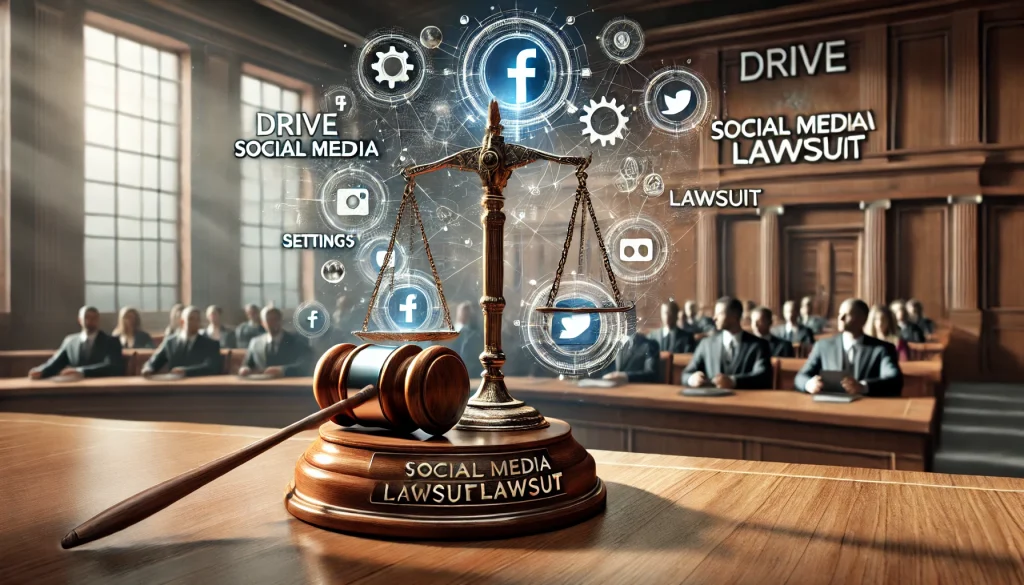The Drive Social Media lawsuit has attracted considerable attention, highlighting critical issues within the digital marketing landscape. As social media continues to be a powerful tool for business growth, legal conflicts like this underscore the importance of understanding industry regulations and ethical practices. The case has raised questions about compliance, transparency, and data usage that resonate across the marketing world.
At the heart of the Drive Social Media lawsuit are concerns that may set new precedents for social media marketing and advertising standards. With growing awareness of privacy rights and ethical advertising, this lawsuit presents an opportunity for businesses to assess their own practices and stay aligned with legal expectations. The outcome could influence how companies approach content, user data, and transparency in future campaigns.
The Drive Social Media lawsuit also reflects broader shifts in legal scrutiny toward digital marketing practices. As more brands turn to social platforms, they face increased accountability for how they engage with and protect their audience. This case may serve as a pivotal example, encouraging both established and emerging social media firms to prioritize ethical practices in their operations.
Understanding the Claims in the Drive Social Media Lawsuit
The Drive Social Media lawsuit centers on claims that touch upon data use, client transparency, and contractual obligations. The plaintiffs allege that Drive Social Media did not fully disclose certain operational practices, leading to potential misrepresentations to clients. Such claims spotlight how transparency can play a significant role in digital marketing and trust with clients.
This case also raises questions about the handling of proprietary data and analytics by social media agencies. In a data-driven industry, clients are increasingly cautious about how their data is accessed and used, making these claims highly relevant to any company working with user information.
Another critical claim in the Drive Social Media lawsuit concerns advertising performance metrics and whether they were accurately presented. Misrepresentation of ad performance can lead to substantial financial repercussions for clients who rely on this data for budget allocations and marketing decisions.
- Key Claims:
- Alleged misrepresentation in performance metrics
- Transparency issues around client reporting and results
- Handling and potential misuse of proprietary client data
Lastly, the lawsuit draws attention to industry regulations that govern agency-client relationships. The outcome of this case may prompt agencies to review contracts and ensure transparency, providing clients with a clearer picture of services and results.
Key Legal Arguments in Social Media-Related Lawsuits
In the Drive Social Media lawsuit, legal arguments likely revolve around contract law, particularly regarding representations made to clients and whether they were fulfilled. Contract law is foundational in agency-client relationships, and breaches, if proven, could lead to significant liabilities.
Another legal argument in the case might address the ethics and legality of performance metrics reporting. When agencies exaggerate or fail to disclose actual results, it can raise claims of fraudulent misrepresentation, a serious issue with implications for client trust and legal compliance.
Privacy rights also play a part, as many digital marketing lawsuits today examine how user data is collected and shared. With privacy laws like GDPR and CCPA, agencies must be clear on their data usage policies. Drive Social Media’s practices in these areas are under scrutiny in this lawsuit, possibly reshaping data handling standards in the industry.
Agencies often face scrutiny for transparency in billing practices, which could be another focal point in the Drive Social Media lawsuit. Ensuring clear and honest billing is essential to maintain client trust and compliance with legal standards.
Finally, this lawsuit highlights how agencies must adhere to not only client expectations but also evolving industry regulations. This case could establish new norms, particularly around transparency and ethics in social media marketing.
The Role of Evidence in High-Profile Media Lawsuits
Evidence is central to the Drive Social Media lawsuit, as it provides the foundation for proving or disproving the claims made. Documentation of client interactions, performance reports, and internal communications could serve as critical pieces of evidence that reveal the truth behind the allegations.
In high-profile cases like this, emails, reports, and contracts often take center stage. These documents provide insights into whether Drive Social Media followed through on its promises and maintained transparency in its dealings with clients.
Forensic data analysis can also play a role, especially if metrics were allegedly misrepresented. A thorough investigation into analytics, performance records, and other digital data might either validate or challenge the plaintiffs’ claims.
- Types of Evidence:
- Contracts and agreements
- Performance and analytics reports
- Internal and client communications
Testimonies from both the plaintiffs and agency representatives are also likely to be used. These testimonies could shed light on agency practices and provide context that complements the documentary evidence presented in the case.
Finally, expert witnesses in digital marketing might offer insights into industry norms, potentially helping the court understand what constitutes acceptable practices versus deceptive ones.
Drive Social Media Lawsuit: Impact on Industry Standards

The Drive Social Media lawsuit is expected to have ripple effects across the digital marketing industry, especially if it leads to new standards for transparency. Many agencies may need to revise their practices to maintain trust and avoid similar legal issues in the future.
This case could prompt a stronger emphasis on clarity in reporting performance metrics. Agencies may adopt standardized reporting templates or implement third-party audits to verify the accuracy of their advertising metrics.
Additionally, this lawsuit highlights the importance of clear data handling and privacy policies. If any legal precedents are set, agencies could be required to offer clients more detailed data usage disclosures, potentially leading to an industry-wide shift toward greater transparency.
- Possible Changes in Industry Standards:
- Enhanced transparency in performance reporting
- Clearer guidelines on data usage and client permissions
- Potential for third-party auditing of advertising metrics
Another anticipated impact is a closer examination of contracts in agency-client relationships. Contracts may become more detailed to define expectations, deliverables, and methods of accountability clearly, helping agencies avoid miscommunication and legal liabilities.
Lastly, this case may inspire social media agencies to build stronger client trust through proactive, transparent practices. This shift could help elevate industry standards and foster more sustainable, ethical client relationships.
How Social Media Lawsuits Shape Digital Marketing Practices
Social media lawsuits, like the Drive Social Media lawsuit, can significantly influence digital marketing practices by setting new standards for transparency and ethics. When disputes arise over practices such as misrepresentation or data misuse, they spotlight the need for clarity and honesty in digital marketing strategies. These cases push agencies to refine their methods to avoid potential legal consequences.
One area impacted by such lawsuits is the presentation of metrics. Digital marketers may need to adopt stricter guidelines for reporting metrics to ensure accuracy and honesty in their performance reports. Misleading clients about advertising reach or engagement metrics, as alleged in some lawsuits, creates trust issues that can damage industry credibility.
Another aspect shaped by these cases is data handling. Legal actions often highlight the importance of responsible data management, prompting agencies to improve their data protection policies. Clearer, more client-focused data policies can mitigate misunderstandings and reduce potential liabilities.
- Key Changes in Digital Marketing Due to Lawsuits:
- Transparent reporting and accurate metrics
- Stronger data protection and usage policies
- Enhanced contractual clarity
Moreover, social media lawsuits encourage agencies to communicate openly with clients about campaign processes, data use, and expected outcomes. This proactive approach can prevent disputes by establishing clear expectations and responsibilities from the outset.
Finally, as the Drive Social Media lawsuit and similar cases shape industry norms, agencies may feel a greater responsibility to maintain ethical practices. This shift fosters a healthier industry environment, emphasizing sustainable client relationships and compliance with legal expectations.
Legal Strategies Commonly Used in Social Media Disputes
In the Drive Social Media lawsuit and other social media-related legal disputes, attorneys often rely on a range of legal strategies to defend their clients or make claims. Contract law plays a central role in these cases, as agencies and clients typically have agreements outlining services and expectations. Breach of contract is a common basis for disputes if one party believes the other did not fulfill its obligations.
Another strategy involves focusing on the accuracy and transparency of performance metrics. When clients allege misrepresentation, defense attorneys may argue that metrics were reported in good faith based on standard practices, while plaintiffs may seek to prove intentional deception. Such disputes highlight the fine line between marketing optimism and misleading claims.
Fraud claims are also prevalent in social media lawsuits if plaintiffs believe the agency misled them knowingly. In these cases, evidence demonstrating intent becomes crucial, and attorneys may focus on internal communications, client interactions, and documented promises to support or refute these claims.
Bullet Points for Common Legal Strategies:
- Breach of contract claims
- Defense of good-faith performance reporting
- Fraud allegations and intent-based arguments
- Use of expert witnesses in digital marketing
Expert witnesses often play a significant role in these cases, offering testimony about industry norms and expectations. By clarifying what constitutes reasonable practices, expert opinions can shape the court’s understanding of the disputed actions.
Lastly, settlements are a common outcome in these lawsuits. Rather than enduring a lengthy trial, parties often negotiate agreements to avoid public disputes and financial risks. This strategy can benefit both parties by providing closure and protecting industry reputations.
Implications of the Drive Social Media Lawsuit for Businesses

The Drive Social Media lawsuit has broad implications for businesses, especially those relying heavily on social media marketing. One of the primary concerns for businesses is the increased emphasis on transparency, as this lawsuit has highlighted the potential consequences of misrepresentation. Companies may feel compelled to work with agencies that prioritize clear, accurate reporting to avoid similar disputes.
Another implication involves the potential for closer scrutiny of agency practices. Companies may now demand more detailed reports and ensure that agencies are clear about their marketing practices, metrics, and expectations. This level of scrutiny helps protect businesses from misleading metrics that could affect decision-making.
The lawsuit also raises awareness of data handling practices. Businesses that value customer privacy and compliance with privacy laws may reconsider how they collect and share data with marketing agencies, particularly if these agencies use sensitive user information for targeted campaigns.
- Business Considerations Post-Lawsuit:
- Increased scrutiny of agency practices
- Demand for transparency and accuracy in reporting
- Awareness of data privacy and legal compliance
Finally, companies may focus more on establishing solid contractual protections when engaging with social media agencies. This approach can help clarify expectations and outline responsibilities, providing a legal safety net in case of disputes.
Ultimately, the Drive Social Media lawsuit serves as a reminder for businesses to be vigilant and thorough in their partnerships, particularly when social media marketing plays a critical role in their brand strategy.
The Role of User Privacy in Social Media Lawsuits
User privacy is a growing concern in social media lawsuits, including the Drive Social Media lawsuit, as it underscores the importance of ethical data use. This case highlights the fine line between effective marketing and intrusive data practices. As privacy regulations like GDPR and CCPA evolve, they place stricter requirements on agencies to protect user information.
In such lawsuits, plaintiffs may allege that their privacy rights were compromised if user data was handled improperly or shared without consent. To counter these claims, agencies must demonstrate compliance with privacy standards and provide evidence that data was used responsibly.
User consent is a key element in these disputes. Lawsuits frequently examine whether users or clients were adequately informed about how their data would be used. Agencies are increasingly required to maintain clear consent practices and respect user preferences, especially as privacy laws continue to advance.
Table: User Privacy Regulations Impacting Social Media Lawsuits
| Regulation | Region | Key Focus | Impact on Agencies |
| GDPR | Europe | Data protection, consent | Higher standards for data handling |
| CCPA | California | Consumer privacy rights | Stricter user data access and sharing |
Privacy audits and regular compliance checks have also become more common in the wake of such lawsuits. Agencies that prioritize data privacy often conduct routine evaluations to ensure they adhere to regulatory standards and minimize potential liabilities.
In the future, privacy concerns in cases like the Drive Social Media lawsuit are expected to intensify, pressuring agencies to create clear, legally sound data policies. This trend reflects a larger shift towards safeguarding user information and maintaining trust in digital marketing.
Examining Precedent Cases Similar to the Drive Social Media Lawsuit
Precedent cases provide insights into common themes in social media lawsuits, particularly regarding transparency, data handling, and contractual clarity. These cases have shaped the digital marketing landscape by highlighting key areas where agencies need to improve their practices to avoid similar disputes.
A few major cases have led to significant settlements or legal outcomes that serve as examples. For instance, cases involving inflated metrics and improper data handling underscore the importance of maintaining transparency and respecting privacy laws. Below is a table summarizing some key precedent cases and their implications for the industry.
| Case | Issue | Outcome | Industry Impact |
| Case A: Inflated Metrics | Misrepresented engagement data | Settlement, financial penalties | Greater focus on accurate metrics reporting |
| Case B: Data Privacy Violation | Unauthorized data usage | Fines, policy changes | Emphasis on transparent data policies |
| Case C: Contract Dispute | Vague terms in client contracts | Court-mandated contractual clarity | Improved contract specificity |
| Case D: Fraud Allegation | Intentional misrepresentation | Legal ruling favoring plaintiffs | Stronger emphasis on ethical standards |
These cases emphasize the importance of transparency, accurate reporting, and clear contractual terms in digital marketing. The Drive Social Media lawsuit is expected to follow similar patterns, potentially reinforcing these standards further.
Future of Digital Marketing Post-Drive Social Media Lawsuit

The Drive Social Media lawsuit could reshape the future of digital marketing by emphasizing transparency and ethical standards. Agencies may prioritize honest reporting, providing clients with verifiable metrics to build trust and avoid legal challenges. This trend towards transparency is expected to set a new benchmark in the industry.
Privacy regulations are likely to play an increasingly significant role in digital marketing strategies. Agencies may adopt more stringent data handling practices to ensure compliance with laws such as GDPR and CCPA. These practices will safeguard user data, improving trust and mitigating risks associated with privacy concerns.
- Potential Industry Shifts:
- Increased transparency in metrics and reporting
- Stronger compliance with privacy laws
- Ethical standards as a competitive advantage
The lawsuit may also prompt digital marketers to develop more robust internal compliance protocols, including regular audits to verify that their practices align with legal requirements. Agencies could establish compliance teams to ensure that policies meet both legal and ethical standards.
As clients become more aware of these issues, they may seek agencies that demonstrate accountability and ethical practices. Agencies that adapt quickly to this shift are likely to benefit, strengthening client relationships and gaining a competitive edge in the marketplace.
Ultimately, the Drive Social Media lawsuit highlights the importance of adapting to legal expectations and fostering ethical practices in digital marketing, a trend that will shape the industry’s future.
Industry Reactions to the Drive Social Media Lawsuit
The Drive Social Media lawsuit has led to a wave of industry responses aimed at strengthening ethical standards and transparency. Many agencies are now implementing third-party audits, while industry organizations are calling for clearer guidelines that address client relationships, privacy, and reporting practices.
In response, some agencies have implemented third-party audits to ensure that their performance metrics are accurate. These audits can verify data, providing clients with reliable information and reinforcing trust in the agency’s services. This move towards transparency is widely supported by industry organizations.
Several professional associations have issued statements calling for updated guidelines. They advocate for industry-wide best practices that address transparency, data privacy, and client trust. This effort aims to set a stronger foundation for ethical and compliant marketing practices.
A table summarizing key industry reactions is provided below:
| Industry Reaction | Description | Impact on Agencies |
| Third-Party Audits | Independent verification of performance metrics | Increases trust, ensures accuracy |
| Updated Ethical Guidelines | Clearer guidelines on transparency and ethics | Standardizes best practices industry-wide |
| Contract Review Initiatives | Revisiting contract terms for clarity | Reduces potential disputes |
| Professional Association Support | Industry bodies advocating for ethical reforms | Builds collective responsibility |
These industry reactions demonstrate a shift towards more rigorous standards, showing that agencies are proactively addressing the issues highlighted by the lawsuit to maintain client trust and compliance.
Protecting Brand Reputation During Legal Disputes in Media
Protecting brand reputation during legal disputes like the Drive Social Media lawsuit is essential, especially when facing public scrutiny. One effective approach is clear, open communication with clients and stakeholders. By proactively addressing concerns, agencies can show they are committed to transparency and accountability, which helps retain trust.
A carefully crafted public statement can help control the narrative, emphasizing the agency’s commitment to ethical practices and client satisfaction. This approach reassures clients that the agency is addressing the issue responsibly and taking necessary steps to prevent future conflicts.
- Reputation Management Strategies:
- Transparent communication with clients and stakeholders
- Public statements highlighting accountability
- Emphasizing commitment to ethical practices
Social media management is another key component. Agencies should monitor and respond to inquiries professionally, ensuring that all responses reinforce the brand’s dedication to transparency and ethical standards. Avoiding defensive or evasive language is crucial for maintaining a positive image.
Monitoring media coverage and managing misinformation is also critical. Working with PR teams to correct inaccuracies or provide clarifications helps mitigate potential reputation damage and ensures the public receives accurate information.
Lastly, maintaining professionalism throughout the dispute reflects positively on the agency, showing that it values integrity even in challenging situations. This approach can ultimately strengthen the brand’s reputation, positioning it as a trustworthy partner in the digital marketing space.
Conclusion
The Drive Social Media lawsuit underscores the growing need for transparency and ethical practices in the digital marketing industry. As clients and regulatory bodies increasingly demand accountability, this case highlights the importance of accurate reporting, clear contracts, and respectful data handling practices. Agencies that prioritize these aspects can foster stronger client relationships and reduce legal risks.
This lawsuit also serves as a reminder for digital marketing agencies to reassess and strengthen their compliance with privacy laws. With regulations like GDPR and CCPA shaping industry standards, agencies are encouraged to adopt robust data protection policies that align with legal expectations. These practices not only protect user privacy but also build client trust.
Finally, as digital marketing continues to grow, this case exemplifies how legal scrutiny can shape industry practices for the better. By adapting to these evolving standards, agencies can position themselves as trustworthy partners in an increasingly competitive market, laying a strong foundation for future growth and resilience.

